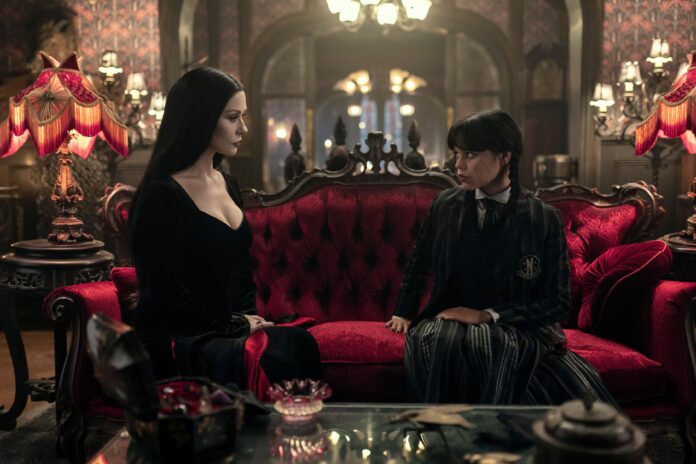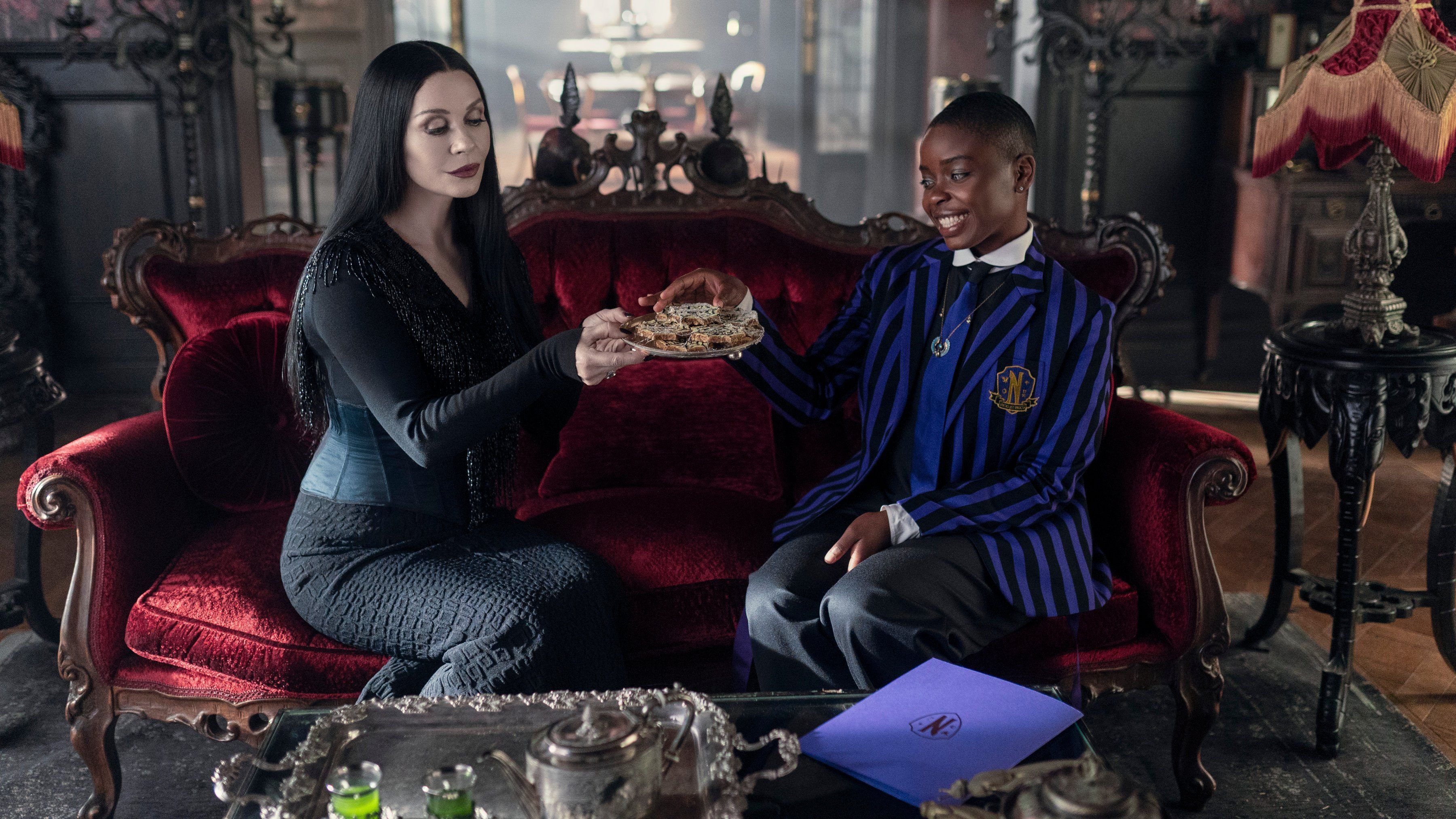As disjointed as Netflix’s Wednesday season 2 may feel at times (thanks to some truly eye-rolling B-plots and contrived love triangles) there is one aspect I can’t help but adore: the wrought relationships between mothers and daughters.
I’ve been a daughter for a long time. And, as a daughter, I’m confident in saying there can be nothing quite so devastating as a mother. Not all mothers are the same, but the one thing they have in common is they’ve known you since before you were born. For some daughters, a mother is the most painful mirror imaginable. A reflection of your strengths, but also your biggest insecurities. For others, the relationship is reversed: your mother is your daughter and you, the daughter, are the mother, the parent who has no other choice but to step into shoes two sizes too big. In Wednesday’s second season, the hit Netflix show explores the complex (and sometimes scary) ways a mother-daughter relationship can take shape and evolve.
In Wednesday’s first season, our protagonist (Jenna Ortega) and her mother Morticia (Catherine Zeta-Jones) butted heads more often than not. However, after Wednesday clears her father Gomez’s (Luis Guzmán) name and bonds with Morticia over their shared prophetic powers, they come to a mutual understanding. Fast-forward to season 2, however, and Morticia and Wednesday are once more coming to blows (quite literally).
For the majority of the first season, Wednesday was pretty much free to do whatever she wanted at her new school, Nevermore, without anyone interfering all too much (outside of the people trying to kill her, of course). But when Morticia takes on a philanthropic position at Nevermore in season 2, Wednesday’s freedom is threatened in a way any teenage daughter will be familiar with: by being told no and having the control swept away from you.
As Wednesday writer Alfred Gough put it to ScreenRant: “Wednesday always wants to try to control the situation. She tried to control her power, which led to her losing it. And Morticia, for all of her lecturing to Wednesday, is kind of a helicopter parent who is very much worried about Wednesday.”
While previous Addams Family adaptations gave Morticia an almost laissez-faire attitude towards her children, Zeta-Jones’ version of the family matriarch is much more hands-on — especially once she finds out Wednesday has been pushing her powers to the limit. This tension escalates after Morticia disposes of the Book of Shadows that Wednesday was using to further improve her powers. What was once a rift has now stretched to become a grand, yawning chasm, and neither mother nor daughter has the emotional tools to cross it.
This is further exacerbated by the arrival of Morticia’s mother, Grandmama Hester Frump (Joanna Lumley). Gough describes her as the “drone parent” to Morticia’s helicopter, always out of reach and inadvertently forcing Morticia and her sister Ophelia to fend for themselves. Hester encourages Wednesday’s lone wolf attitude, which only upsets Morticia further because it was this lack of care that led to Ophelia going missing in the first place. Morticia refuses to be like her mother and clings to Wednesday, which only works in pushing her away further.
Generational trauma makes for compelling TV, and it isn’t limited to the Addams family, either. Bianca Barclay (Joy Sunday), a siren and a friend of Wednesday, has her own tumultuous relationship with her mother, Gabrielle Barclay (Gracy Goldman.) In season 1, we’re introduced to Bianca’s mother as this domineering force who uses her siren powers of manipulation to scam innocent and vulnerable people into joining her cult. Fast-forward to season 2, and Bianca is once more dragged into her mother’s influence by effectively stepping into the role of mother herself — Gabrielle is on the run after her self-help app MorningSong gets exposed, her husband Gideon is out to get her, and she’s practically helpless thanks to her fading powers and empty bank account. It’s a shocking turn of events for Bianca, who swore she would never become like her mother and hurt others with her powers, but has little choice but to do just that to protect herself and Gabrielle from outside forces looking to harm them.
Wednesday and Bianca, and their messy relationships with their mothers, act as foils to one another. Neither wants to be anything like their mother, yet while Wednesday grew up in a loving home, Bianca was forced to go on the run to escape her mother’s influence. Gabrielle’s feelings for Bianca are based on control. Morticia’s feelings for Wednesday are based on the love and affection she didn’t receive from Hester. The two mothers come from two very different perspectives, but while Wednesday is able to hold onto her independence and control, Bianca becomes a tool to be used.
It is these complicated and complex relationships between mother and daughter that, ultimately, keep me tuning into Wednesday far more than the incompatible love triangles and lackluster romance. My own relationship with my mother was complicated, even more so now that she’s gone and there are things left unsaid, but while our relationship was thorny, it was also full of love and a mutual understanding that neither of us was perfect. It’s because of my own experience that I can’t help but be drawn to seeing it play out on TV. I’m hopeful that, with the second part of the season releasing on Sept. 3, we’ll see an emotional pay-off that’ll bring these relationships together… or wrench them further apart.


